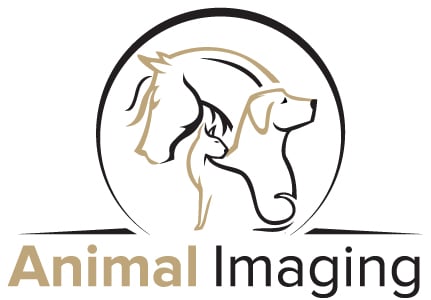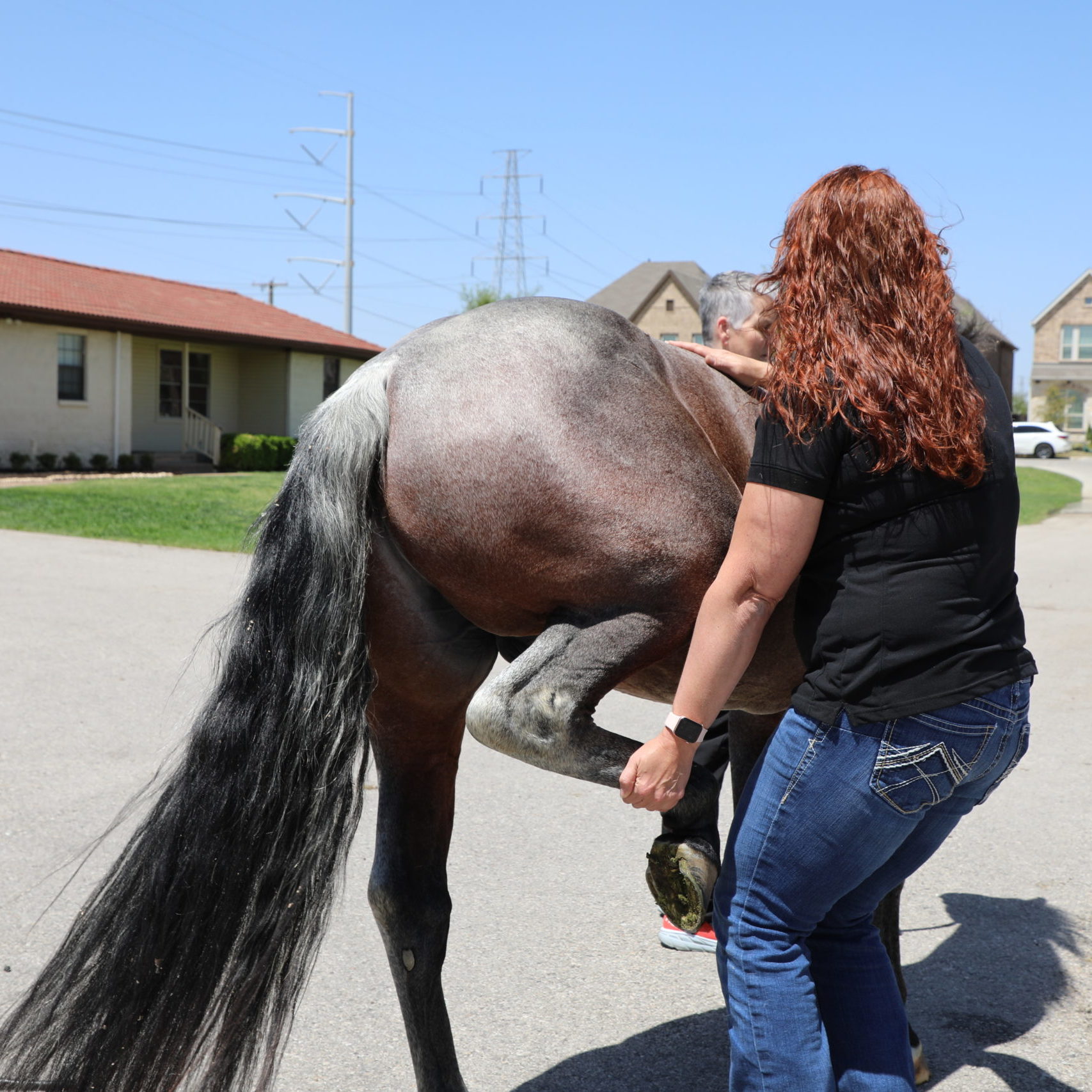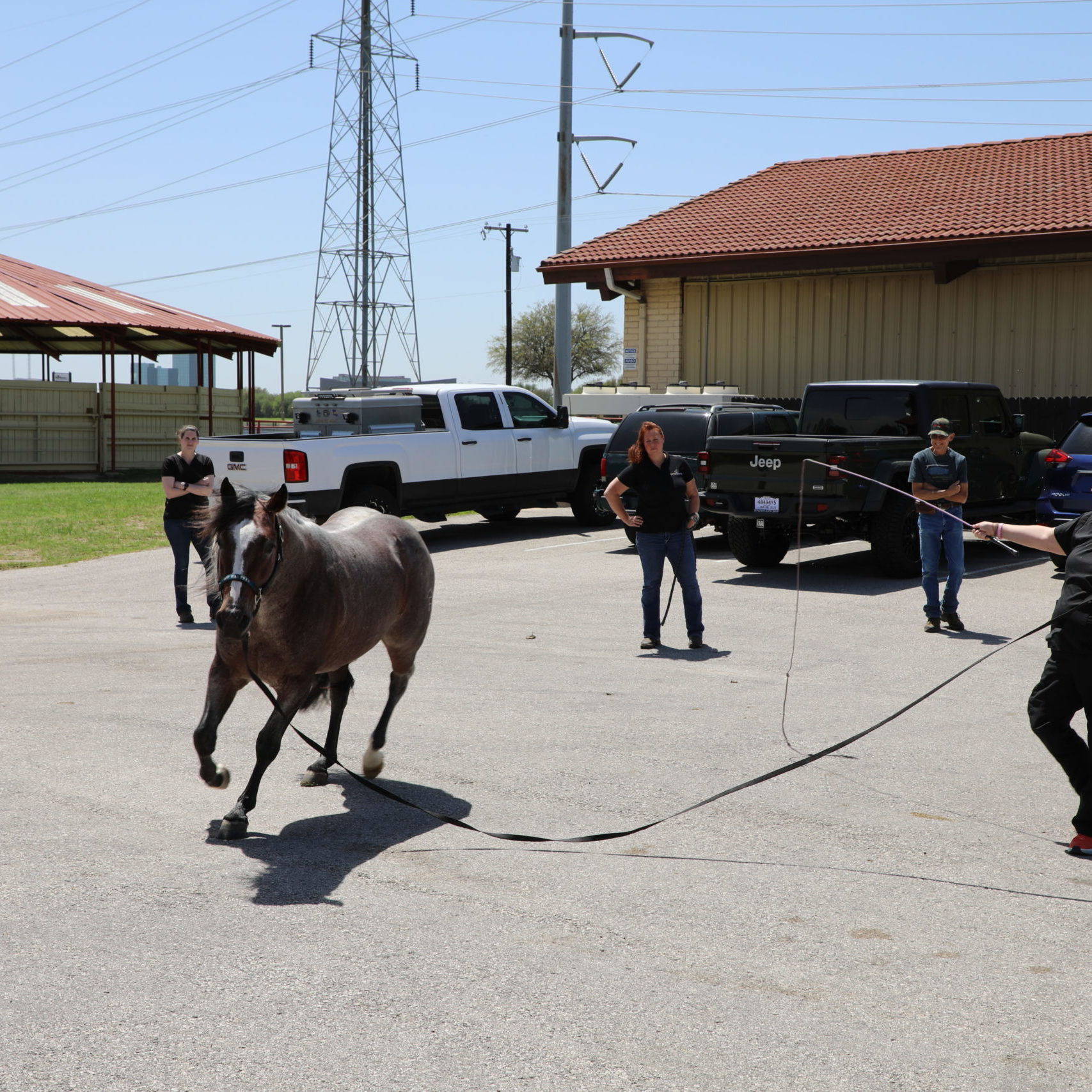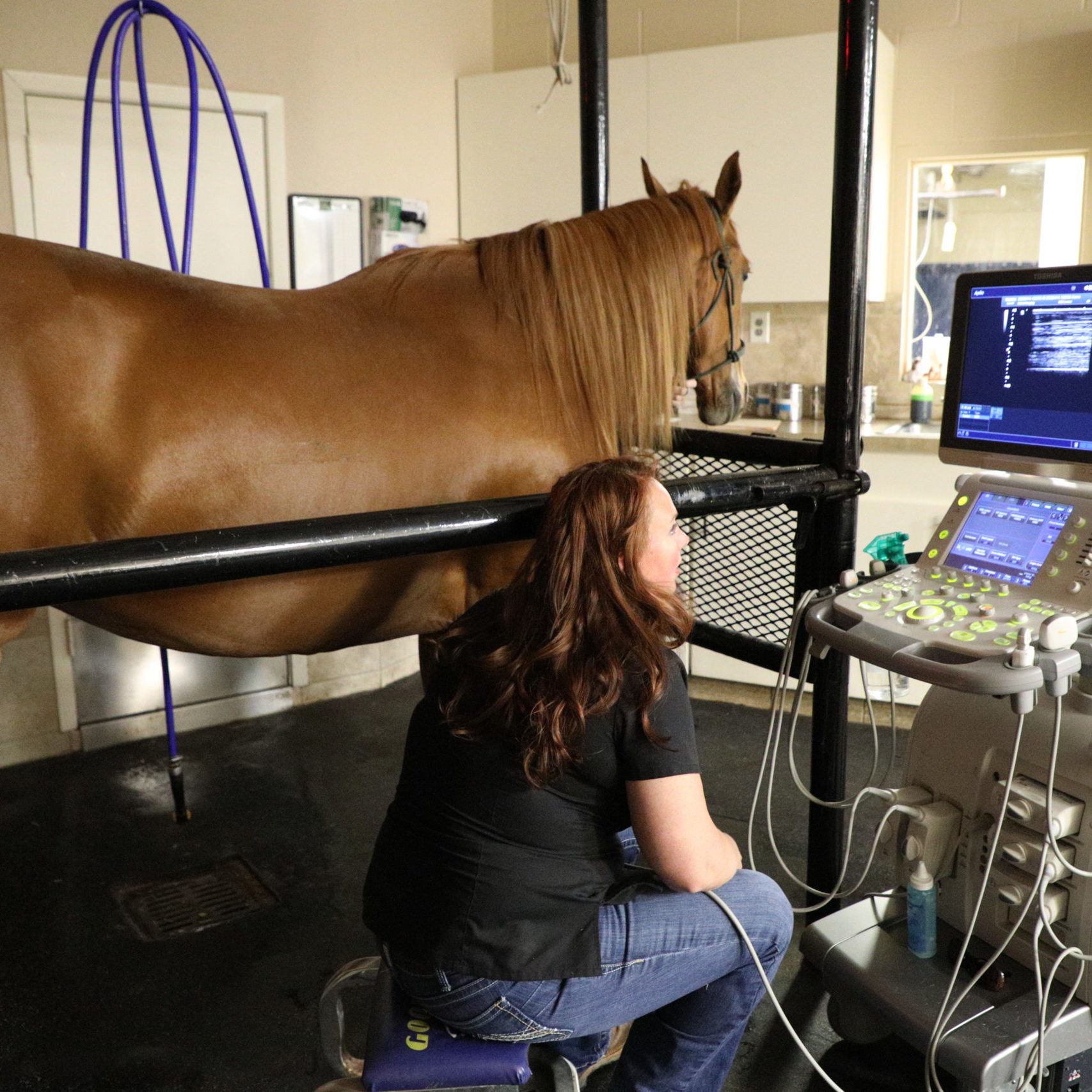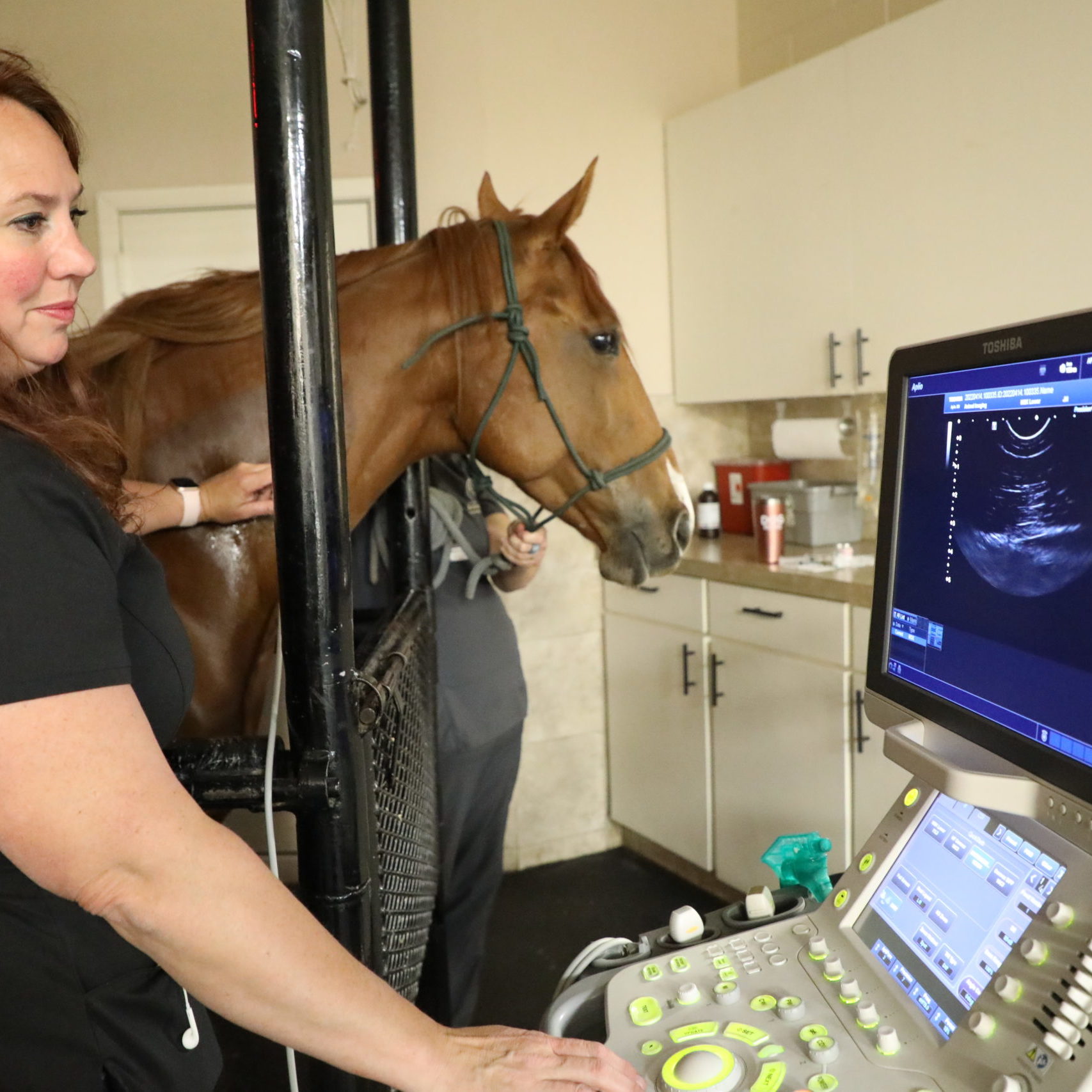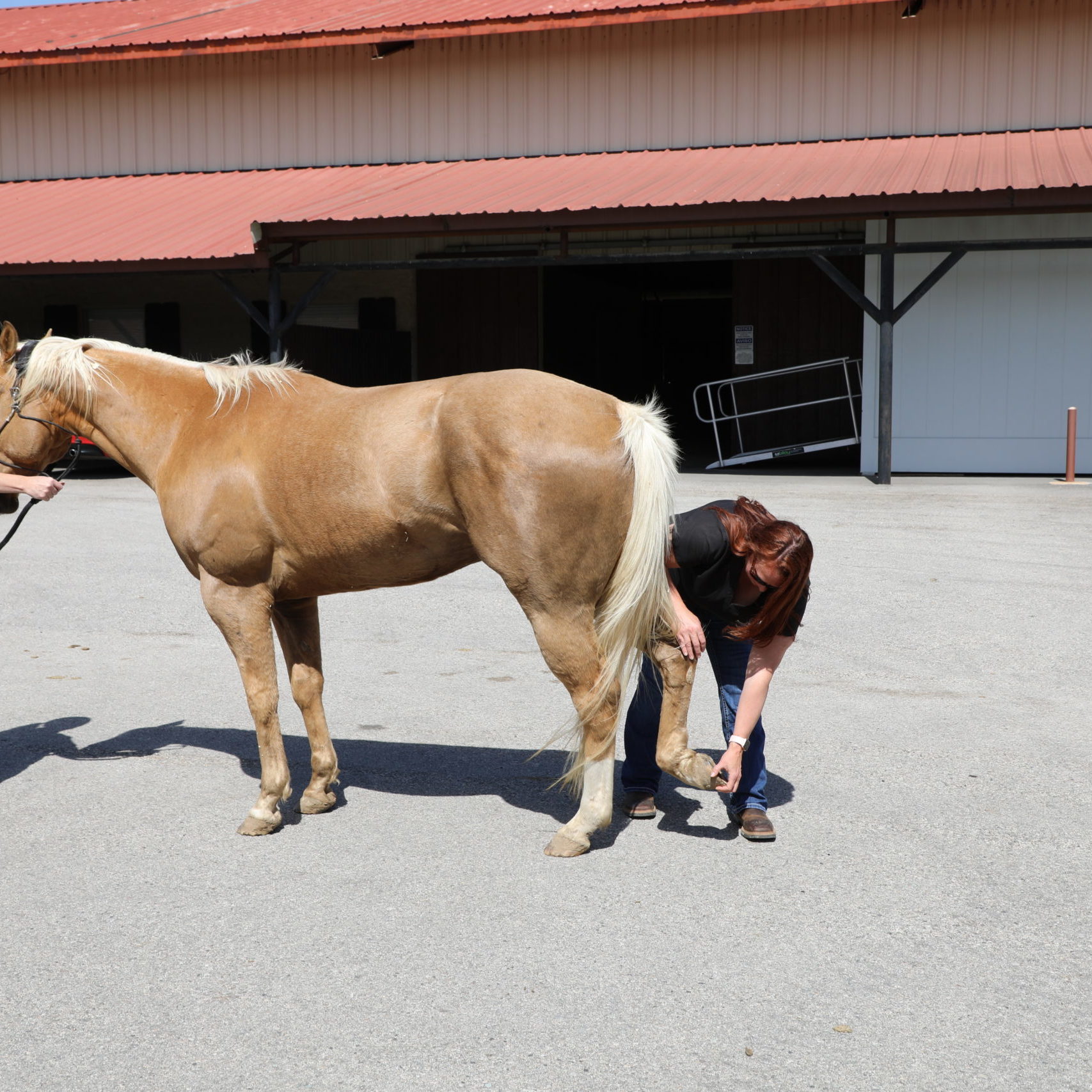All of these services can be provided at the request of the referring veterinarian.
Soundness exams (lameness, prepurchase)
We understand that most horses will have had a full lameness work-up prior to referral, but Dr. Armentrout can offer work-ups on a referral basis for veterinarians that simply don’t have the time or facilities for a full soundness exam. Dr. Armentrout offers a complete and comprehensive lameness diagnostic service that helps to provide advanced and state-of-the-art care for the equine athlete. She has extensive training and expertise in evaluating lameness in horses under a wide variety of disciplines within the equine industry. With a wide variety of diagnostic imaging modalities readily available, including digital radiography, digital ultrasound, MRI, CT and nuclear scintigraphy, diagnosing the source of a horse’s lameness can be achieved here at Animal Imaging.
COMMON INDICATIONS FOR SOUNDNESS EXAMS
- Musculoskeletal pain or lameness issues
- Back or neck soreness
- Poor performance
- Weakness
- Prior to purchase
Myelography
Cervical myelography is used to determine the nature, extent, and site of cervical vertebral malformations or cord compression associated with soft tissue or bony changes or trauma. Dr. Armentrout will collect CSF samples that can be sent back to the referring veterinarian or sent directly to the lab at the veterinarian’s request for any testing requested by the rDVM. The entire procedure takes around 30 minutes and can be done on an outpatient basis if necessary. Static, flexed, and extended views are taken under general anesthesia and then standing films are taken once recovery is complete and the dye column is still visible.
COMMON INDICATIONS FOR MYELOGRAPHY
- Neurological deficits with suspected impingement of spinal cord
- CSF collection
Ultrasonography
In-depth ultrasonography can be difficult in the field depending on the facilities available. Dr. Armentrout is well-versed in musculoskeletal and soft tissue ultrasonography and has daily appointments available for all your imaging needs. Following nuclear scintigraphy, our doctor can help obtain ultrasound images of areas at the referring doctor’s request and offers services such as ultrasound guided cervical-facet injections, fine needle aspirates and biopsies, and standing cervical CSF collection.
COMMON INDICATIONS FOR MYELOGRAPHY
- Cervical facet injections
- Cardiac abnormalities (murmur or arrythmia)
- Pneumonia or pleuropneumonia
- Abdominal organ visualization +/- biopsy
- Identifying lesions post-MRI in order to assist referring veterinarians will follow-up exams
Equine Regenerative Medicine and Orthobiologics
Dr. Armentrout is well-versed in regenerative medicine and orthobiologics and can treat patients in the hospital under the direction of the referring veterinarian as well as help veterinarians decide what treatment modality may best suit each case. We offer in-house orthobiological therapeutics as well as the ability to harvest bone marrow that can be sent to the laboratory of choice of the regular veterinarian for processing for stem cells.
COMMON INDICATIONS FOR THE USE OF ORTHOBIOLOGICS
- Musculoskeletal injury causing lameness issues
- Desire to decrease steroid use
- Improved healing
- Slow the course of disease
Joint injections
There are times that joint injections in the ambulatory setting may be impractical due to facilities, patient temperament, or just having the extra set of hands necessary to perform the procedure safely. Additionally, with the current shortage of veterinarians and increasing equine population, clients are in the unusual position of having prolonged wait times to secure an appointment with their equine veterinarian. Dr. Armentrout is well versed in all joint injections, including upper limb joint and bursa injections that aren’t performed as commonly (cubital, scapulohumeral, bicipital bursa, coxofemoral, trochanteric bursa, sacroiliac, lumbar intertransverse) as well as temporomandibular joint injections and ultrasound-guided cervical facet injections. These injections can be performed while the horse is in the hospital, and often while still sedated for the imaging study that has been ordered. Many veterinarians have been pleased that we can offer therapeutic injections at the time of diagnosis in order to facilitate faster therapy as well as decrease the current burden of the overabundance of patients needed to be treated in a day in traditional private practice.
COMMON INDICATIONS FOR JOINT INJECTIONS
- Musculoskeletal pain or lameness issues
- Back or neck soreness
- Poor performance
- Osteoarthritis or synovitis
Endoscopy
We have a 1.1 meter video endoscope that allows us to visualize the upper respiratory tract, guttural pouches, bladder, and uterus. This is a useful adjunct to complicated airway cases that may require CT imaging as well as something we can offer to help our ambulatory-only colleagues that don’t have access to video endoscopy. We can get our referring veterinarians a same-day diagnosis and images for cases referred to the hospital.
COMMON INDICATIONS FOR ENDOSCOPIC EXAMS
- Airway noise
- Exercise intolerance
- Acute onset of cranial nerve dysfunction
- Poor performance
- Nasal discharge
- Hematuria
- Uterine cyst evaluation and removal
Platelet Rich Plasma
Platelet Rich Plasma (PRP) therapy is a joint/bone therapy used to treat joint disease and traumatic soft tissue injuries. The treatment involves drawing blood from the horse and processing their own blood in a specialize centrifuge to concentrate the platelets and other valuable blood elements in the plasma that contain growth factors, anti-inflammatories, and other beneficial substances. PRP may be injected in a single or in multiple locations based on the injury. For example, in the case of back soreness after a thorough diagnostic evaluation, the back is injected in the primary region of injury using this natural product from the patient themselves. Here at Animal Imaging, we work with your equine practitioner to find the answers for different joint and bone related injuries and then recommend the appropriate therapy options like PRP.
COMMON INDICATIONS OF PRP
- Bone disease
- Joint disease
- Athletic injuries of the back, neck and key ligamentous structures
Acupuncture
Dr. Armentrout offers acupuncture services that can be performed at the hospital. Dr. Armentrout received her acupuncture training and certification from the CuraCore Vet program where there is a focus on learning acupuncture from a neuroanatomical perspective. Acupuncture is very effective for pain relief, to reduce inflammation, improve blood supply, release painful muscles or spasms, and much more.
COMMON INDICATIONS FOR ACUPUNCTURE
- Musculoskeletal pain or lameness issues
- Back soreness
- Poor performance
- Weakness
- Anhidrosis (lack of sweating)
- Skin issues
- Facial nerve paralysis
- Suprascapular nerve paralysis (sweeney)
Chiropractic
Dr. Armentrout offers chiropractic services that can be performed at the hospital. Dr. Armentrout received her chiropractic training from Animal Chiropractic Education Source (ACES). Chiropractic is a drug-free approach to equine health care. It deals with the nervous system housed inside the spinal column and treats neuromusculoskeletal function or dysfunction. It can be a great tool that can be used in conjunction with our traditional therapies for lameness and other conditions. It can also be used to help maintain health and soundness. After a chiropractic adjustment, the client will receive instructions on post-adjustment care including stretches, exercise, and home therapy recommendations, as well as a request to follow up with the regular veterinarian to discuss findings and other possible therapies.
COMMON INDICATIONS FOR CHIROPRACTIC
- Poor performance
- Maintenance of joint and spinal health
- Injuries from slips and falls
- Muscle spasms and nerve problems
- TMJ pain
- Trouble getting up and down including shoe boils
- Geriatric care
- Recovery from illness, injury, or surgery
Following the service, one of our board-certified radiologists will review all the images and submit a final report within 24-48 hours of the exam. The report and clinical findings will then be sent to the referring veterinarian. Clients should follow up with the referring veterinarian for explanation of results and information on treatment or management.
We are here to help.
At Animal Imaging, our passion is providing the best care and information to you and your veterinarian.
We are proud to have a dedicated team of board-certified veterinary radiologists available for your pet.
Questions or concerns? Call us!
(972) 869-2180
BE IN THE KNOW
Enter your email to be the first to hear about the latest case studies, announcements, and upcoming exclusive CE events.
